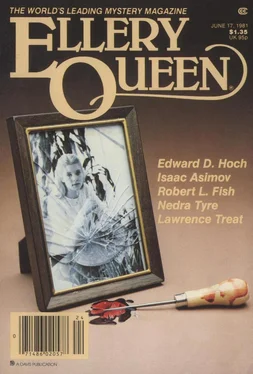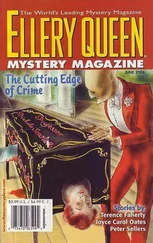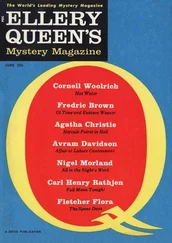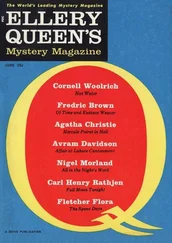Isaac Asimov - Ellery Queen’s Mystery Magazine. Vol. 77, No. 7. Whole No. 454, June 17, 1981
Здесь есть возможность читать онлайн «Isaac Asimov - Ellery Queen’s Mystery Magazine. Vol. 77, No. 7. Whole No. 454, June 17, 1981» весь текст электронной книги совершенно бесплатно (целиком полную версию без сокращений). В некоторых случаях можно слушать аудио, скачать через торрент в формате fb2 и присутствует краткое содержание. Город: New York, Год выпуска: 1981, ISBN: 1981, Издательство: Davis Publications, Жанр: Детектив, на английском языке. Описание произведения, (предисловие) а так же отзывы посетителей доступны на портале библиотеки ЛибКат.
- Название:Ellery Queen’s Mystery Magazine. Vol. 77, No. 7. Whole No. 454, June 17, 1981
- Автор:
- Издательство:Davis Publications
- Жанр:
- Год:1981
- Город:New York
- ISBN:ISSN: 0013-6328
- Рейтинг книги:5 / 5. Голосов: 1
-
Избранное:Добавить в избранное
- Отзывы:
-
Ваша оценка:
- 100
- 1
- 2
- 3
- 4
- 5
Ellery Queen’s Mystery Magazine. Vol. 77, No. 7. Whole No. 454, June 17, 1981: краткое содержание, описание и аннотация
Предлагаем к чтению аннотацию, описание, краткое содержание или предисловие (зависит от того, что написал сам автор книги «Ellery Queen’s Mystery Magazine. Vol. 77, No. 7. Whole No. 454, June 17, 1981»). Если вы не нашли необходимую информацию о книге — напишите в комментариях, мы постараемся отыскать её.
Ellery Queen’s Mystery Magazine. Vol. 77, No. 7. Whole No. 454, June 17, 1981 — читать онлайн бесплатно полную книгу (весь текст) целиком
Ниже представлен текст книги, разбитый по страницам. Система сохранения места последней прочитанной страницы, позволяет с удобством читать онлайн бесплатно книгу «Ellery Queen’s Mystery Magazine. Vol. 77, No. 7. Whole No. 454, June 17, 1981», без необходимости каждый раз заново искать на чём Вы остановились. Поставьте закладку, и сможете в любой момент перейти на страницу, на которой закончили чтение.
Интервал:
Закладка:
I only half lied. I had no intention of ever, ever becoming a teacher, but on the other hand I wasn’t going to switch to Madison after two years either. I just didn’t want to be pushed into the work force so soon after high school.
After the war, I tried going back to college under the G. I. Bill, but it didn’t work out. I was also in no particular hurry to go anywhere and I figured that after 3 years, 3 months, and 21 days — but who counts? — in the army I was due for a long vacation. So I settled for working in my father’s tailor shop for room and board. I’ve always suffered from a sinful lack of ambition. All I’ve ever really wanted was a quiet day, no fuss, and time to myself.
It wasn’t really a bad life at all, but eventually I was forced to face the fact that the tailor shop wouldn’t go on forever and neither would my father. And I wasn’t all that keen to take over the shop anyway. My father would say — in continuing astonishment — “I’ve been a tailor for forty years, and I still don’t like it.”
EQMN: How did you come to write?
RITCHIE: At about this time, my mother, as a hobby, joined a local writer’s club and one thing led to another and she got an agent, Larry Sternig. I had never given serious thought to writing before. Up until that time I had never written anything at all except for a few themes at school. When I got A’s it was usually for neatness.
But there I was in my early thirties and it was about time I settled upon some congenial trade. So I sat down and wrote a sports story about an ambidextrous pitcher and when Larry showed up one day to talk to my mother I handed him the story. He had that “Oh, God, everybody thinks he can write” expression on his face. But he showed up the next day with a smile and that started the whole thing. I decided I’d write 50 short stories, one a week, while still working in the tailor shop, and if none of them sold during that year, then the hell with it. The eighth story sold and that settled the question. So did most of the other seven eventually, including the sports story.
EQMN: Where did Larry make that first sale?
RITCHIE: To the now defunct New York Daily Mirror , for fifty bucks. That was large money in those days.
EQMN: And you’re still with the Sternig Agency.
RITCHIE: Yes. I’ve always regarded Larry as much a friend as an agent. And perhaps I’ve just been fortunate or Larry’s an exceptional person, but I think that a writer should stick with one agent. So many writers, it seems, change agents like hats, and I don’t think it pays off in the long run.
The Jury Box
by Jon L. Breen
© 1981 by Jon L. Breen
For a decade before his creation of Perry Mason, Erie Stanley Gardner was one of the best and most prolific contributors to the pulp magazines, usually but not always in the mystery-detective genre. Two new collections of his pulp novelettes demonstrate the deceptive versatility of a writer many associate only with the Mason and Cool-Lam formulae.
**** Erle Stanley Gardner: The Amazing Adventures of Lester Leith, edited and with an Introduction by Ellery Queen, Dial Press, $9.95. Leith, who solves crimes by reading the newspaper accounts and then concocts elaborate schemes to appropriate the loot (20 % for himself, 80 % for charity), is one of Gardner’s best series characters. He can be likened to a juggler or a magician, and his adventures are triumphs of misdirection as surely as the works of John Dickson Carr and Clayton Rawson. He accomplishes his Robin Hood exploits despite the presence in his employ (as valet) of a police spy.
These five cases have not appeared in any previous Gardner collections. The sixty to seventy uncollected Leith stories must include enough good ones to fill several more volumes, and I hope they will.
*** Erle Stanley Gardner: The Human Zero: The Science Fiction Stories of Erie Stanley Gardner , edited by Martin H. Greenberg and Charles G. Waugh, Morrow, $12.95. Though all seven of these novelettes (from Argosy , 1928–1932) are creditable examples of the pulp writer’s craft, the urban s.f.-detective hybrids (the title story and “A Year and a Day”), reminiscent of some of Murray Leinster’s early work, will probably interest mystery readers more than the Burroughs-type jungle adventure yarns. The one interplanetary tale, “The Sky’s the Limit,” is the weakest of the group.
*** Patricia Moyes: Angel Death, Holt, Rinehart, and Winston, $10.95. Scotland Yard’s Henry Tibbett gets plenty of vacations, but he is no more successful than any other fictional detective in managing a crime-free holiday. He and Emmy again visit the fictitious British Seaward Islands and become involved in a complicated and dangerous drug-trade case. This is more a thriller — rather in the Tuppence and Tommy mode — than a formal detective story, but Moyes’ writing is as charming as ever.
*** James McClure: The Blood of an Englishman, Harper and Row, $10.95. The greatest attractions of the Kramer-Zondi series are the characters and the trenchant observations on South African society. But with the social commentary, McClure offers plots as intricately constructed and detective work as carefully described as a practitioner from the formalist Thirties.
*** Doris Shannon: The Punishment, St. Martin’s, $12.95. In a compelling and cunningly crafted novel of horror, the Quiller family (an odd assortment indeed) hold a family reunion on a remote island off the coast of Maine — in an old house with a history of violent death and depravity. Shannon will keep you reading, but my gothic consultant thought the climax was marred by one Talent too many.
*** Victor Canning: Fall from Grace, Morrow, $9.95. One question is at the center of this book: has the charming sociopath, John Corbin, a poetry-quoting sometime writer working on a history of the family gardens for a Church of England bishop, really been reformed by love, or is he still (as we somehow hope) the despicable rogue we met at the outset of the novel? As always, Canning’s writing is smooth, civilized, and eminently readable.
*** John Wainwright: Man of Law, St. Martin’s, $9.95. Two college friends — one now a Q.C., the other a psychiatric expert witness — do courtroom battle. The usual twists and turns of a Wainwright plot are here in abundance, though his trial may demand quite a bit of artistic license.
*** David Williams: Murder for Treasure, St. Martin’s, $9.95. The proposed takeover of Rigley’s Patent Footbalm by an American conglomerate brings banker-sleuth Mark Treasure to Wales. Williams delivers a measure of wit, action, and puzzle-plotting worthy of the British answer to Emma Lathen’s John Putnam Thatcher.
*** Joe L. Hensley: Outcasts, Doubleday-Crime Club, $9.95. The novels about midwestern lawyer Donald Robak seem to be getting better and better. Hensley’s writing is marked by an ability to capture character with precision and economy. The murderer here is interesting and surprising but takes some believing.
** Tom Murphy: Auction, Signet, $2.95. This is a good honest job in the “bestseller” genre, featuring a well rendered background of a New York auction house, mini-series dialogue, stock characters presented in detail if not depth, and the usual blockbuster padding. The fairly predictable latter stages would benefit from more mystery. The novel is fun to read but ultimately delivers less than its 400-page length warrants.
John Dunning’s Looking for Ginger North (Fawcett-Gold Medal, $1.95), missed by this department on its appearance over a year ago, may be tough to find now, but it’s worth the effort. Besides an intriguing plot, it offers the best and most believable depiction of a racetrack backstretch and its people I’ve found in any mystery novel.
Читать дальшеИнтервал:
Закладка:
Похожие книги на «Ellery Queen’s Mystery Magazine. Vol. 77, No. 7. Whole No. 454, June 17, 1981»
Представляем Вашему вниманию похожие книги на «Ellery Queen’s Mystery Magazine. Vol. 77, No. 7. Whole No. 454, June 17, 1981» списком для выбора. Мы отобрали схожую по названию и смыслу литературу в надежде предоставить читателям больше вариантов отыскать новые, интересные, ещё непрочитанные произведения.
Обсуждение, отзывы о книге «Ellery Queen’s Mystery Magazine. Vol. 77, No. 7. Whole No. 454, June 17, 1981» и просто собственные мнения читателей. Оставьте ваши комментарии, напишите, что Вы думаете о произведении, его смысле или главных героях. Укажите что конкретно понравилось, а что нет, и почему Вы так считаете.












